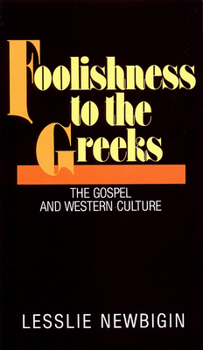Foolishness to the Greeks: The Gospel and Western Culture
Select Format
Select Condition 
Book Overview
How can biblical authority be a reality for those shaped by the modern world? This book treats the First World as a mission field, offering a unique perspective on the relationship between the gospel and current society by presenting an outsider's view of contemporary Western culture.
Format:Paperback
Language:English
ISBN:0802801765
ISBN13:9780802801760
Release Date:June 1988
Publisher:William B. Eerdmans Publishing Company
Length:160 Pages
Weight:0.41 lbs.
Dimensions:0.4" x 6.0" x 8.4"
Customer Reviews
5 ratings
Wonderful book to challenge your perspective on Christianity and Culture
Published by Thriftbooks.com User , 15 years ago
There is an emerging awakening to look at how Christianity/Gospel dialogues and influences public life and culture. Lesslie Newbigin is a voice that needs to be considered in this dialogue. It's truly unfortunate that more leaders are not reading Newbigin. However, if you desire to have a deep, pastoral response to the changes that we are experiencing in a Post-Christendom society, then read Foolishness to the Greeks.
Great Book
Published by Thriftbooks.com User , 17 years ago
Newbigin does a great service in this book. He gives an introduction to practical thinking about ministry in a changing and postmodern world. Highly recomended.
Solid and creative thinking
Published by Thriftbooks.com User , 19 years ago
This is an excellent resource that presents a fresh approach to its topics and offers a creative and effective presentation of the role of theology in public life and discourse. I would say that its minor weakness would be an incomplete understanding of economics and an (understandable, given the time of its writing) preoccupation with the polarity between capitalism and communism. The result is that Newbigin's economic critique is a bit off-target. There are legitimate critiques of capitalism to make from his perspective but they require a better appreciation of the virtues of capitalism than he demonstrates. One hopes a latter day disciple will issue a fresh edition with a new foreword that could address this minor shortcoming in an otherwise superb small volume.
Searching honesty
Published by Thriftbooks.com User , 19 years ago
In this work, Newbigin explores the relationship of Christianity to power with a searching honesty that few others have matched. While appreciative of Christendom's accomplishments, Newbigin suggests that the power granted the church in Christendom overestimates Christians' grasp of the truth and underestimates the tendency for power to corrupt the church. But the failures of Christendom do not thereby justify completely abandoning the attempt to influence the powers of secular society. Newbigin forcefully argues that Christians cannot simply set aside efforts to influence worldly powers in favor of "sectarian protest" against those powers. Society and it institutions will be guided by some vision of the good life (they cannot be neutral in this regard), and if that vision is the wrong one, much needless harm and spiritual suffering will result. In service to the world, then, Christians must offer their vision of the good life as the truth which should guide individuals and their institutions. Newbigin attempts to articulate an intermediate position (along the lines suggested by Abraham Kuyper) that falls somewhere between Christendom and sectarian protest. Serious questions may be raised about Newbigin's proposal, but his unwillingness to settle for the extremes makes this work a wonderful launching point for further reflection. Whatever model one adopts for Christian activity in the secular sphere, Newbigin suggests that for any engagement with secular culture to be successful Christians will have to first grapple with postmodern pessimism towards the concepts of truth and knowledge. Newbigin considers postmodernity's legitimate insights into the relationship between knowledge and power but moves beyond postmodern skepticism to sketch an epistemology that is appropriately humble yet also hopeful about the possibility of gaining insight into the truth.
Academic, Powerful, and Profound
Published by Thriftbooks.com User , 19 years ago
Lesslie Newbigin's asks the question, how can the Gospel transform a western culture that has fragmented life into two categories: Facts and Values. Facts are scientifically proven matters of public knowledge where there is either Truth or False. Values are the private beliefs a person lives by and makes decisions by. They are not provable according to the scientific method, so there is no way to state them as fact. So, is this the realm of the Gospel? Should the sovereignty of God and the sacrifice of Christ stay carefully stowed and talked about in the private parts of our lives? Or should the Gospel become a mandated part of the public life? Throughout the book she discusses the delicate dichotomy between and the tightrope we as recipients of Grace should live. It was an eye-opening and profound book. My one critique is that the content at times was so thick I got lost in the minutia versus the heart of her message. I think anyone interested in the conversation of Christianity, Culture, Capitalism, and the desire to prove all facts with the scientific method would be benefited by reading this careful academic text.






